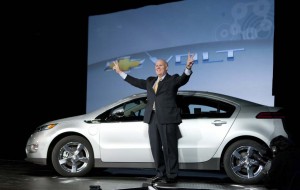General Motors could take as much as a 7% stake in French automaker PSA Peugeot Citroen as part of a new alliance the two manufacturers are putting into place.
The alliance is expected to involve a variety of different areas of business, notably including joint vehicle and powertrain development, according to knowledgeable sources. The key goal for both manufacturers would be to improve their economies of scale, especially in Europe, where GM last year lost $747 million. But whether the proposed alliance will help turn things around for GM’s red ink-stained Opel division remains to be seen.
Peugeot is the Continent’s second-largest maker on a unit sales basis but has serious problems of its own, rising debt leading it to plan a 1 billion Euro ($1.34 billion) rights offering that notably could reduce the holdings of the founding Peugeot family.
Beyond possible cross-holdings, the alliance appears to focus on three areas, according to sources:
- The joint development of future product platforms;
- The joint development of future powertrains, especially diesels; and
- Shared component and parts purchasing.
Neither GM nor Peugeot would comment on the proposed alliance. Senior Peugeot officials recently confirmed the talks were underway but GM has declined to say anything other than noting it frequently discusses options with its competitors.
“It’s a good deal because it lets Peugeot focus on small cars and outsource (to GM) development of crossover models,” said Jim Hall, chief analyst with 2953 Analytics. “That will all help economies of scale” in a market where cost-containment is becoming a critical issue.
GM is reportedly ready to take as much as a 7% stake in PSA, which traces its roots back to the 19th Century, when steel and toolmaker Peugeot-Frères et Jacques Maillard-Salins entered the automotive business. Thierry Peugeot, the current chairman, is the great-grandson of Eugene Peugeot, who rolled out his first automobile in 1891. Four close relatives currently sit on the company’s board.
Any equity sale would require their approval and appears likely to involve the sale of some of their shares. Reports from Europe indicate GM would accept a standstill agreement. It would not be allowed to buy additional shares without the PSA board’s approval.
Both makers clearly have reason to seek help. The French maker saw European sales drop by 8.8% in 2011, to 1.68 million vehicles. GM’s sales on the Continent were down 1.9%, to 1.17 million. The maker had earlier hoped to achieve a breakeven in 2011 and get Europe back in the black in 2012, but this year’s target seems highly unlikely, according to most observers.
GM has actually scored some gains on the Continent through its Chevrolet brand, which focuses on the low end of the market. But it has continued to struggle righting the mainstream Opel, which has serious issues that the alliance “don’t appear to address,” cautioned to analyst Hall.
“Those issues have to do with the cost of labor in Germany and its brand image,” he added, noting that Opel is seen as a largely down-market manufacturer compared to European leaders like Volkswagen and its various brands.
Even more skeptical is long-time industry analyst and consultant Maryann Keller. “The history of collaborations in the auto industry that involve equity — or even if they don’t involve equity — is miserable,” she told the Bloomberg news service. “What in the world do you get by buying a tiny stake of a French company where you could never lay anybody off or close a factory?”
GM certainly can look at its own recent history to understand the pitfalls of partnering. Former CEO Rick Wagoner, a long-time advocate of the alliance strategy, was forced to terminate relationships with manufacturers such as Subaru, Suzuki, Isuzu and Fiat as the U.S. maker plunged towards its 2009 bankruptcy. GM, in fact, had to pay Fiat $2 billion to end their alliance.
The irony of that break-up is that the pay-off helped the Italian maker get through its own cash crisis, revive its product program and generate enough funds to help support its 2009 takeover of Chrysler as the smallest of the U.S. makers emerged from Chapter 11 protection.
PSA recently pulled out of a proposed alliance with Japan’s Mitsubishi Motors, but it continues partnerships with both BMW and Ford Motor Co.


Is this a bad case of deja vu? GM’s investing in European auto manufacturers has, for recent years, been a train wreck. Let me be the first to say – No more bail out for GM. They have not learned ant thing.